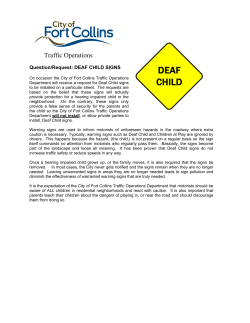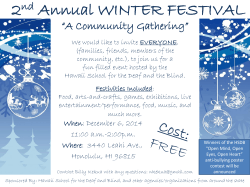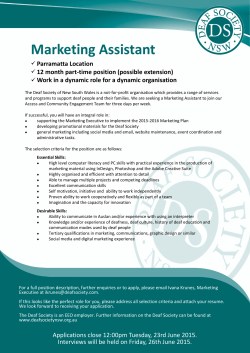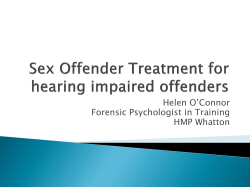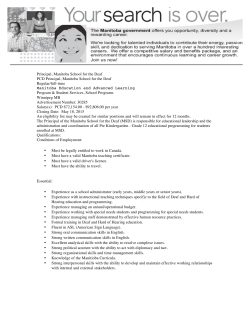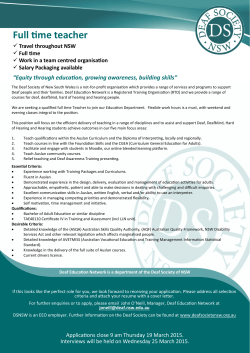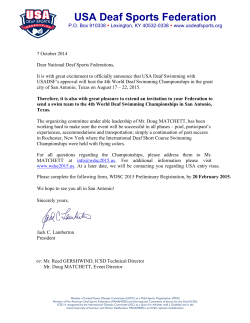
Deaf - Barbados Council for the Disabled
Always ask what the preferred communication method is. Be aware of the environment. Large and crowded areas can be very difficult for persons with some hea oss. Bright sunlight and shadows can also present barriers to people who read lips. Always ask what the preferred communication method is. Be aware of the en Large and crowded areas can be very difficult for persons with some hearing loss. Always ask what the preferred communication method is. Be aware of the env Sign Language Alphabet abcdefg hijklmn opqrstu vwxyz 12345 67890 A B H C I O D J K P V E Q F L M R W X G S T Y 6 3 7 4 8 U a national grouping of all organizations for and of persons with disabilities, dedicated to the health and well-being of its members and all other persons with disabilities in our society. For additional information, contact: BARBADOS COUNCIL FOR THE DISABLED Harambee House The Garrison, St Michael Barbados Z Numbers 2 N The Barbados Council for the Disabled is 5 9 0 Telephone: 246 427-8136 Fax: 246 427-5210 Opening Hours Mon - Fri 9:00am to 5:00pm Closed weekend and public holidays E-mail: bcd@caribsurf.com Website: www.barbadosdisabled.org.bb Produced with the kind assistance of Signia Financial. Communicating With The Deaf Communicating with the Deaf Look directly at the person. Don't obscure your face or mouth with your hand, facial hair, microphone, or other distractions. Always ask what the preferred communication method is. Be aware of the environment. Don't change topics in a conversation without warning. Use transitional phrases such as, "Okay, we need to discuss..." Never say, "Just forget it." If you're experiencing difficulty communicating. If communicating orally, ask if you can write. Keep messages simple and direct. Large and crowded areas can be very difficult for persons with some hearing loss. Communicating through an interpreter? Don't say, "Tell her that..." Bright sunlight and shadows can also present barriers to people who read lips. Don't speak to the interpreter nor try to involve him/her in the conversation. Focus on the deaf individual. To gain the attention of a person who is deaf or hard of hearing, first call his or her name. If there's no response, touch them lightly on the arm or shoulder. Signal by moving hands where they can see. Speak clearly and evenly. Don't exaggerate your speech. Try rephrasing your sentence if you areasked to repeat yourself several times. Detailed information that involves a number or address might better be provided through an alternate means of communication. Making life Accessible for the Deaf The Deaf Community has a culture, which is unique and beautiful. Communication is often a challenging task for many, but by employing the skills and tips outlined in short guide, you can embrace the deaf. Positive Language • Avoid the terms “Deaf Mute”, “Deaf and Dumb” or “Hard of Hearing”. • Preferred terminology: “Deaf” or “The Hearing Impaired”. • Deaf: A person who cannot rely on their hearing for processing information • Hard of hearing: Persons who may have some usable auditory skills with a slight to moderate degree of hearing. Accessibility Issues When providing services for the general public, inclusion of the deaf necessitates the availability of some or all of the following. • Text telephones allow electronic communication for the deaf. • When providing access to televised information, it is recommended that television equipped with close captioning system be used. • Use a Sign Language Interpreter. Sign Language Interpreters Sign language is not a random group of uncoordinated gestures, but rather a highly sophisticated and complex form of communication. Interpreters must be well trained and maintain the highest standard of ethics. Interpreters facilitate the inclusion of the Deaf in oral presentations. The American Sign Language (ASL) is most commonly used. OK KITCHEN ENGLISH GOOD Health and Safety Audible alarms must have an intensity and frequency that can attract the attention of partial hearing loss. Visual alarms should be lights arranged to flash in conjunction with the audible emergency alarms. Always ask what the preferred communication method is. Be aware of the environment. Large and crowded areas can be very difficult for persons with some he loss. Bright sunlight and shadows can also present barriers to people who read lips. Always ask what the preferred communication method is. Be aware of the e Large and crowded areas can be very difficult for persons with some hearing loss. Always ask what the preferred communication method is. Be aware of the en
© Copyright 2025
